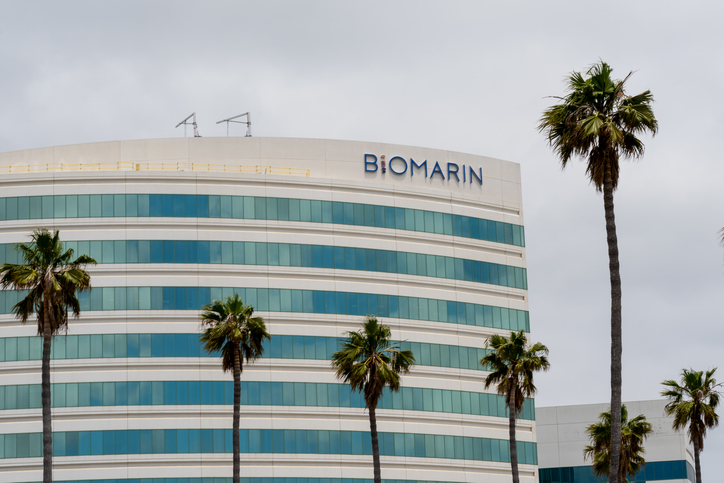
BioMarin Pharmaceutical is building up its pipeline with the acquisition of Inozyme Pharma in a $270 million deal centered on an enzyme replacement therapy that could become the first FDA-approved treatment for a rare disease that is often fatal to infants born with it.
Terms of the acquisition agreement announced Friday call for BioMarin to pay $4 in cash for each share of Boston-based Inozyme. While that’s a premium to the $1.42 closing price on Thursday, it’s still below the stock’s 52-week high of $6.24. Inozyme’s stock price has been on a mostly downward trend since its 2020 IPO, priced at $16 per share, raised $112 million as the biotech prepared to advance to the clinic with lead program INZ-701.
INZ-701 has reached Phase 3 testing for pyrophosphatase/phosphodiesterase 1 (ENPP1) deficiency, which is caused by mutations to the ENPP1 gene. The ENPP1 enzyme plays a key role in processes such as bone mineralization, soft-tissue calcification, and immune modulation. Deficiency of this enzyme can lead to calcium buildup in arteries, narrowing the blood vessels and leading to cardiovascular problems that can become fatal, particularly in infants. The calcification can also affect bones and joint tissue.
INZ-701, a fusion protein engineered to replace the ENPP1 enzyme, is administered as a once-weekly subcutaneous injection. An open-label Phase 3 test underway is evaluating the therapy in children between the ages of 1 and 13. In its report of first quarter 2025 financial results released earlier this week, Inozyme said it expects to complete one-year dosing for all participants next January; preliminary data are expected in the first quarter of 2026. To date, INZ-701 has been safe and well tolerated by patients. This therapy is also in Phase 2 testing for ABCC6 deficiency and in Phase 1 testing for calciphylaxis.
The acquisition gives Inozyme some breathing room. In March, the biotech announced a strategic reprioritization. Patients currently in the ABBC6 deficiency trial would continue to be treated, but future trials in this disorder and calciphylaxis would be postponed. Inozyme cut 25% of its workforce to make its cash last into the first quarter of 2026.
In a note sent to investors, Leerink Partners analyst Joseph Schwartz said Inozyme’s therapy fits with BioMarin’s existing infrastructure. He added that the $270 million price leaves BioMarin with plenty of firepower left to pursue more deals. William Blair analyst Sami Corwin acknowledged the encouraging data for INZ-071 so far, but her research note said additional work in finding eligible patients is needed to give the firm confidence that BioMarin can build on the 670 U.S. patients that Inozyme has identified.
San Rafael, California-based BioMarin is already well established in enzyme replacement therapies. The company’s first product was Naglazyme, an enzyme replacement therapy approved in 2005 for treating mucopolysaccharidosis VI. BioMarin’s top product is Vimizim, approved in 2014 as an enzyme replacement therapy for mucopolysaccharidosis IVA. Vimizim generated $739.8 million in revenue last year. Speaking during a conference call Friday, BioMarin CEO Alexander Hardy described the Inozyme therapy as “a strong strategic fit.”

Navigating The Right Steps For Your Healthcare Startup
This webinar will explore how a banking platform approach could be the resource for your company.
“Like five of our six enzyme therapies, it would be a first-in-disease treatment,” said Hardy, who joined BioMarin last year after serving as CEO of Genentech. “Adding this investigational therapy to our enzyme therapies portfolio is a natural addition to our late-stage pipeline, and, if data supported, we will leverage our regulatory and commercialization know-how in countries across the world to provide access to INZ-701 to patients across our global footprint.”
BioMarin estimates the total addressable population for INZ-701 is between 2,000 and 2,500 patients, Hardy said. The company believes most of those patients will be found outside of the U.S. That was BioMarin’s experience with Naglazyme, and the company’s ability to identify patients helped grow the market for that product, he said. Based on current estimates of the patient population, BioMarin projects INZ-701 could achieve $400 million to $600 million in peak sales by the mid-2030s.
The BioMarin and Inozyme boards of directors have approved the transaction, which the companies expect to close in the third quarter of this year, subject to customary approvals and the tender of the majority of Inozyme shares.
Photo: Getty Images








